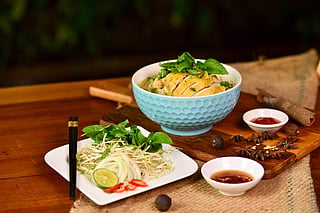- Destinations
- Experiences
- Stay
- What's new
- Editor’s Picks
- Responsible Tourism
- CampaignsCampaigns
- Subscribe

Vietnamese cuisine is a tantalising blend of flavours, colours, and textures that has captured the hearts and taste buds of food enthusiasts worldwide. Known for its fresh ingredients, fragrant herbs, and balance of sweet, sour, salty, and umami flavors, Vietnamese cuisine offers a unique and unforgettable culinary experience. Here's a look at some must-know facts about Vietnamese cuisine, including its history, key ingredients, iconic dishes, and culinary influences.
The Xu Wing and Mahābhūta principles are the cornerstone of Vietnamese cuisine, much like in numerous other Asian culinary traditions. These philosophies underscore the significance of achieving harmony among the five essential flavour components: sweetness, tartness, saltiness, bitterness, and spiciness, creating a genuinely invigorating dining experience with every meal.
In Vietnam, breakfast leans heavily toward savoury options, with few indulging in sugary cereals. Vietnamese morning rituals typically revolve around steaming bowls of hot soup, fragrant broken rice, and delicious bánh mì sandwiches, reflecting the early riser culture. While the famous pho soup has traditionally been a morning staple, it's enjoyed at any hour of the day.
Given Vietnam's sweltering climate, it's no wonder that people have a penchant for cooling, liquid desserts. Vietnamese cuisine offers a delightful array of sweet concoctions collectively known as "chè," encompassing dessert soups, beverages, and puddings, often featuring ingredients such as coconut milk, mung or kidney beans, and various fruits. Among the top choices are "chè bắp," a sweetcorn and glutinous rice pudding, and "chè chuôi," a delectable banana and coconut milk soup.
Vietnam is divided into three distinct regions: North, South, and Central, each boasting its own culinary identity. While there are some shared elements among these regional cuisines, they take great pride in their distinctive attributes. In Northern Vietnam, dishes tend to be less spicy, with a preference for the nuanced heat of black pepper rather than chilli. On the other hand, Central Vietnamese cuisine is renowned for its intricate interplay of spicy flavours, creating a captivating complexity. Meanwhile, Southern Vietnamese cuisine is a delightful symphony of sweetness that tantalises the taste buds.
As the world's second-largest coffee exporter, Vietnamese coffee beans are nothing short of exceptional. Affectionately dubbed "rocket fuel" by some, Vietnamese coffee is robust and brimming with flavour. It delivers a potent punch that awakens your senses and imbues you with the confidence to tackle the day ahead.
A beloved delicacy in Vietnam, animal blood soup, typically sourced from ducks or pigs, consists of freshly collected animal blood, fish sauce, cooked meat, and an assortment of herbs. In terms of flavour, it offers a cool, tangy, and creamy sensation, often enjoyed alongside potent rice wine. While it's a common treat during special occasions like the Lunar New Year, one can also encounter Tiết canh being served on the bustling streets of Vietnam.
Fish sauce stands as an essential cornerstone of Vietnamese cuisine, alongside olive oil and soy sauce. It plays a pivotal role in many iconic Vietnamese dishes, including pho, spring rolls, banh xeo, com tam, com thit nuong, and countless others. Vietnamese culinary traditions simply wouldn't be the same without the invaluable contribution of this remarkable ingredient.
Despite their name and appearance, fetal duck eggs are an affordable, delicious, and nutrient-rich street-side snack widely available throughout Vietnam. These eggs are especially beloved among Vietnamese children, much like boiled chicken eggs are cherished by kids in Western countries. Served with essential condiments and presented beautifully, you can find fetal duck eggs sold at street-side stalls nationwide.
